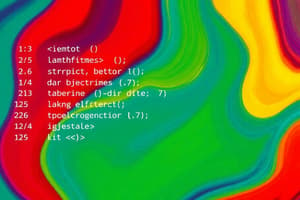Podcast
Questions and Answers
What is the key difference between classes and objects in Java?
What is the key difference between classes and objects in Java?
- Classes are used to group related objects, while objects are used to group related classes.
- Classes are abstract representations, while objects are concrete instances.
- Classes are used to create objects, while objects are used to create classes.
- Classes define the structure of objects, while objects are instances of a class. (correct)
What is the purpose of a constructor in Java?
What is the purpose of a constructor in Java?
- Constructors are used to provide a return type for a class.
- Constructors are used to create new objects of a class.
- Constructors are used to define the behavior of a class.
- Constructors are used to set the initial state of an object. (correct)
What is the purpose of encapsulation in Java?
What is the purpose of encapsulation in Java?
- Encapsulation is used to hide the implementation details of a class. (correct)
- Encapsulation is used to make programs easier to debug.
- Encapsulation is used to prevent errors in the program.
- Encapsulation is used to allow direct access to the data fields of a class.
How can you declare a constant in a Java class?
How can you declare a constant in a Java class?
What is the difference between instance methods and static methods in Java?
What is the difference between instance methods and static methods in Java?
What happens when you invoke a method with an object argument in Java?
What happens when you invoke a method with an object argument in Java?
Flashcards are hidden until you start studying
Study Notes
- Classes represent entities in the real world that can be distinctly identified, while objects are instances of a class.
- Constructors are invoked to create objects in Java and must have the same name as the class but do not have a return type.
- Default constructors are provided automatically if no constructors are explicitly defined in a class in Java.
- Encapsulation in Java involves declaring data fields as private to make programs easier to maintain and prevent errors.
- Encapsulation means that data fields should be declared private and can be accessed through public methods.
- To declare a constant in a class in Java, you use the "final static" keywords.
- When creating a random object in Java, you need to specify the seed or use the default seed.
- Instance methods in Java are associated with individual objects, while static methods are associated with the class itself.
- Immutable objects in Java cannot have their contents modified and all properties must be private.
- When invoking a method with an object argument in Java, the reference of the object is passed.- Variables i and j are discussed in a block scope, with i being 2 and j being j0.
- The text explores the possibility of declaring the same variable name in different blocks within a class.
- A code snippet involving a Circle class constructor and radius assignment is analyzed, pointing out potential errors.
- The text discusses scenarios where certain statements need to be placed before others in code for proper execution.
- Various coding questions and errors are addressed and corrected throughout the text.
Studying That Suits You
Use AI to generate personalized quizzes and flashcards to suit your learning preferences.



